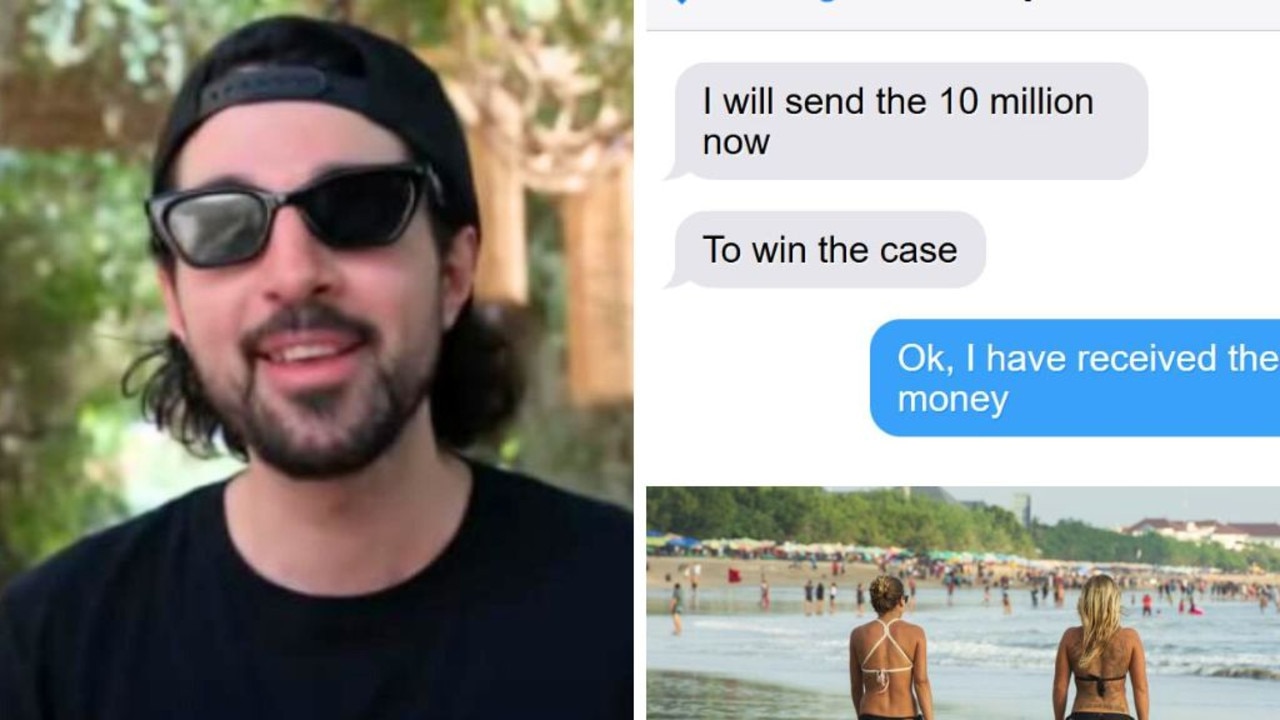UN’s Human Rights Council launches probe into Russian ‘abuses’ in Ukraine
The United Nations has appointed a judge to lead a probe into Russia’s misdeeds in Ukraine - as the Kremlin throws cold water on hopes for peace.
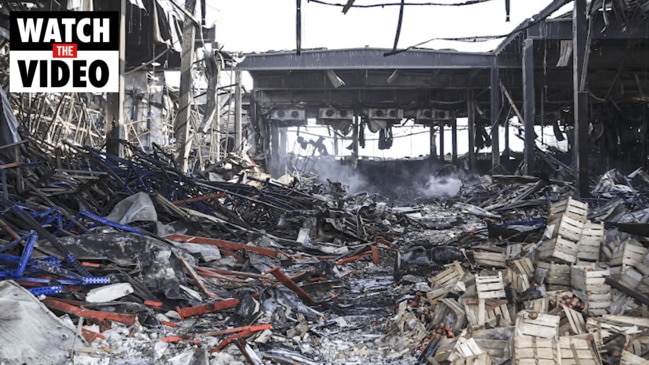
World
Don't miss out on the headlines from World. Followed categories will be added to My News.
As the Kremlin played down hopes of a breakthrough following peace talks with Ukraine, the UN Human Rights Council appointed a judge to lead an investigation into Russia’s misdeeds in the war.
Meanwhile, the International Criminal Court in The Hague has also already begun investigating possible war crimes in Ukraine.
Norwegian Erik Mose, has served on several international courts.
A former judge on Norway’s supreme court and on the European Court of Human Rights, and previously president of the International Criminal Tribunal for Rwanda, he was named chair of the newly created independent international commission of inquiry.
Human Rights Council president Federico Villegas also appointed Jasminka Dzumhur, the human rights ombudsperson of Bosnia Herzegovina, and Pablo de Greiff of Colombia, who has served as the UN’s top expert on the promotion of truth, justice and reparations, to the three-person team.
The top UN rights body agreed in a historic vote earlier this month to establish the highest-level probe into possible abuses committed leading up to and since Russia’s invasion of Ukraine on February 24.
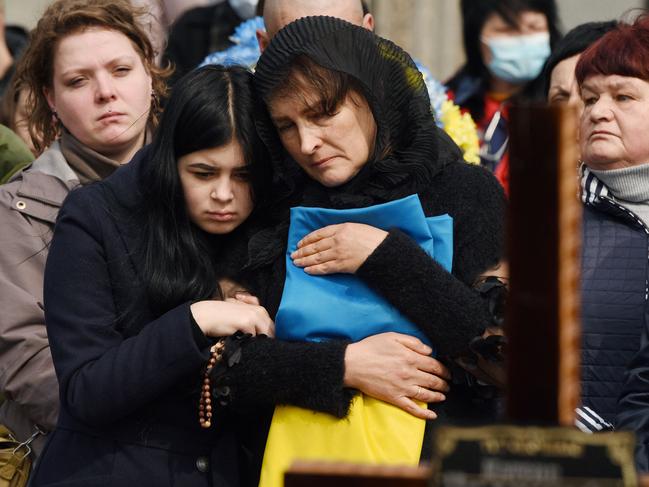
Thousands of people have died and millions have been displaced since Russia invaded its pro-Western neighbour.
In a resolution voted through on March 4, the council condemned “in the strongest possible terms” the violations resulting from Russia’s “aggression” against Ukraine.
The three investigators will be asked to “establish the facts, circumstances, and root causes of any such violations and abuses,” and to gather evidence “with a view to ensuring that those responsible are held accountable,” according to the resolution.
The move came as the Kremlin played down hopes of a breakthrough coming from peace talks held a day earlier between Russian and Ukrainian delegates.
“We cannot state that there was anything too promising or any breakthroughs,” Kremlin spokesman Dmitry Peskov told reporters, adding that Moscow considered it “positive” that Kyiv had started outlining its demands in writing.
UKRAINIAN MISSILE HIT IN RUSSIA
Ukraine forces may have retaliated with a missile hit in Russia.
Video circulating online appears to show a hit on a temporary Russian military camp outside Belgorod, in Russia’s village of Krasny Oktyabr, about 64km from the Ukrainian city of Kharkiv, according to the Russian state-run news agency Tass. The source of the explosion is not immediately known.
Regional Gov. Vyacheslav Gladkov said there were no casualties, but an emergency service worker told Tass that four Russian soldiers were injured.
If it is a Ukraine strike, it would mark the nation’s first significant strike against Russia.
It comes after Russia pledged to scale down fighting around two Ukrainian cities including Kyiv following peace talks on Tuesday, but the United States led a chorus of sharp scepticism over Moscow’s intentions.
The talks between Russia and Ukraine in Istanbul raised hopes after more than a month of war that has left thousands dead, and prompted negotiators to suggest a meeting between the two presidents.
On the ground the violence was still having a devastating impact, as Ukraine said at least nine people were killed and 28 wounded Tuesday by a Russian air strike on a government building in the southern city of Mykolaiv.
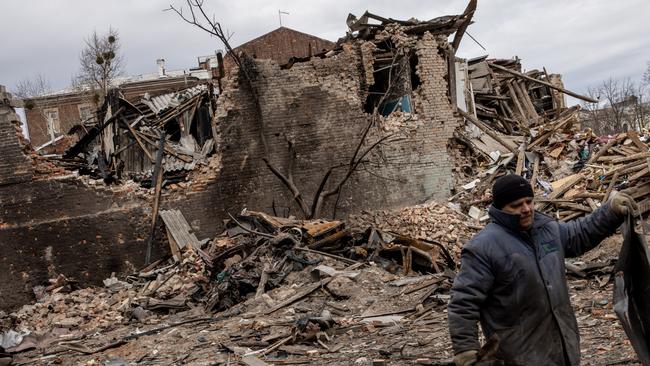
Following the talks in Turkey though, Ukrainian negotiator David Arakhamia said there were “sufficient” conditions for President Volodymyr Zelenskyy and his Russian counterpart Vladimir Putin to meet in a bid to end Europe’s worst conflict in decades.
Russian Deputy Defence Minister Alexander Fomin said there had been progress in talks on “the neutrality and non-nuclear status of Ukraine”.
“A decision has been made to radically, by several times reduce the military activity” around the capital Kyiv and the city of Chernigiv, he said.
Russia’s chief negotiator Vladimir Medinsky said there had been a “meaningful discussion” at the talks.
But the United States immediately cast doubt on Moscow’s words, and Western leaders vowed to keep “raising the costs” on Russia for its invasion.
OFFENSIVE PLANNED ELSEWHERE?
US officials said that while a small number of Russian forces were stepping back from Kyiv, the vast majority of its positions remained.
“We’re not prepared to call this a retreat or even a withdrawal,” Pentagon spokesman John Kirby said.
“We all should be prepared to watch for a major offensive against other areas of Ukraine … It does not mean that the threat to Kyiv is over.”
A spokesman for British Prime Minister Boris Johnson joined in the distrust, saying: “We will judge Putin and his regime by his actions and not by his words”.
US President Joe Biden meanwhile spoke with Mr Johnson and the leaders of France, Germany and Italy as they sought to harden their unified stance against Moscow.
“The leaders affirmed their determination to continue raising costs on Russia for its brutal attacks in Ukraine as well as to continue supplying Ukraine with security assistance,” the White House said in a readout of the call.
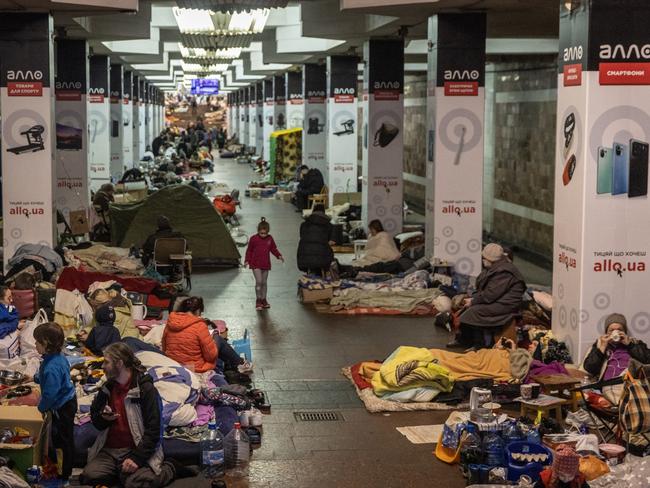
Following Tuesday’s announcements, European and US stock markets lifted and oil prices fell by five per cent as supply fears eased, while the ruble surged 10 per cent against the dollar.
Hours earlier a Russian strike against the regional government headquarters in Mykolaiv left nine dead, officials said, adding to a toll estimated by Mr Zelenskyy at 20,000 so far.
“I was having breakfast in my apartment,” Donald, 69, a retired Canadian postal worker with Ukrainian residency told AFP.
“I heard a whoosh, then a boom and my windows rattled.”
Another local resident, Viktor Gaivonenko, who was helping clean up the debris, said: “Putin is a bastard. That’s all there is to it”.
Ukraine’s fighters pushed back Russian forces from around the city in recent days and have recaptured territory in other parts of the country, including the suburban town of Irpin outside Kyiv – an important gateway to the capital.
‘CRIME AGAINST HUMANITY’
In response to the invasion, the West has imposed crushing economic sanctions and many companies have exited Russia.
There have also been several rounds of diplomatic expulsions, which continued Tuesday with Belgium, Ireland and the Netherlands announcing a total of 42 diplomats would be expelled.
There can be no talk of lifting sanctions imposed on Russia over its invasion of Ukraine until And, President Zelenskyy said the West’s sanctions must remain until the war is over.
“The question of sanctions cannot even be raised until this war is over, until we get back what is ours,” he said in a video address late Tuesday.
Russia has hit back against Western sanctions, saying its gas deliveries to the European Union must now be paid for in rubles.
“Nobody will supply gas for free. This is just impossible. And it can only be paid in rubles,” Kremlin spokesman Dmitry Peskov told reporters.
Russia also said it was expelling 10 diplomats from Estonia, Latvia and Lithuania in a tit-for-tat move.
While Ukraine’s forces are counterattacking in the north, they are struggling to retain control of the devastated southern port city of Mariupol.
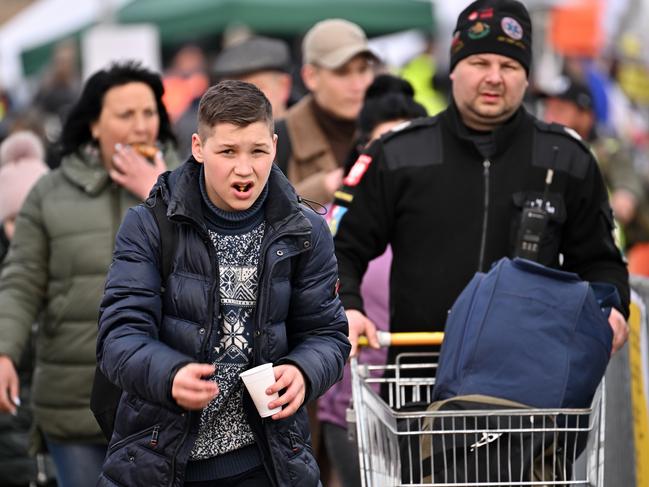
Russian forces have encircled the city and are conducting steady and indiscriminate bombardment, trapping an estimated 160,000 people with little food, water or medicine.
At least 5000 people there have already died, according to one senior Ukrainian official who estimated the real toll may be closer to 10,000.
Mr Zelenskyy said the Russian siege constituted a “crime against humanity, which is happening in front of the eyes of the whole planet in real time”.
As he opened the Russia-Ukraine talks, Turkish President Recep Tayyip Erdogan urged the delegations to “put an end to this tragedy”.
Russian oligarch and Chelsea Football Club owner Roman Abramovich, who has been hit by Western sanctions, was also in attendance.
The Kremlin said he was acting as an intermediary and denied reports he had been poisoned during previous talks in Ukraine.
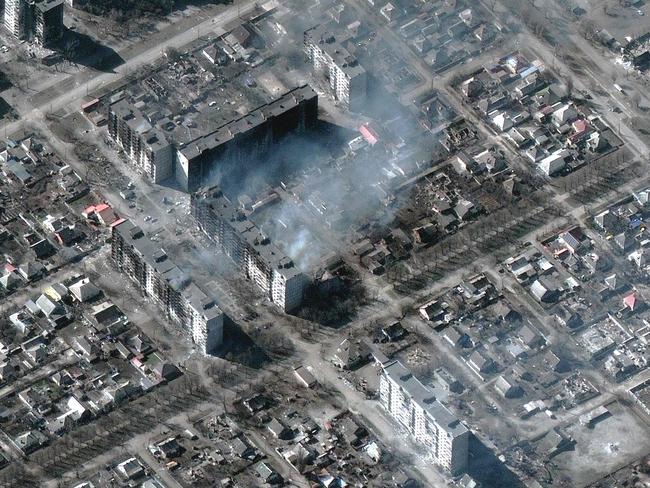
UN NUCLEAR VISIT
Ukraine’s foreign ministry called the Mariupol situation “catastrophic,” saying Russia’s assault from land, sea and air had turned a city once home to 450,000 people “into dust”.
France, Greece and Turkey are hoping to launch a mass evacuation of civilians from Mariupol within days, according to Mr Macron.
But the French president, after speaking with Mr Putin on Tuesday, said conditions for such an operation were not yet met.
President Biden has expressed his “moral outrage” at the conduct of the war, and ruffled feathers recently by suggesting his Russian counterpart could not remain in power. He has since denied seeking regime change in Russia as US policy.
The conflict has raised fears over nuclear safety after Russia seized several facilities, including Chernobyl, site of the world’s worst nuclear disaster.
The chief of the International Atomic Energy Agency, the UN atomic watchdog, was visiting Ukraine on Tuesday.
“We must act now to help prevent the danger of a nuclear accident,” IAEA chief Rafael Grossi said on Twitter.
ZELENSKYY TO ADDRESS AUSTRALIA
Ukrainian President Volodymyr Zelenskyy is expected to address Australia’s parliament on Thursday evening.
Mr Zelenskyy is due to give a speech from 5.30pm, thanking Australia for its support for Ukraine as the conflict caused by the Russian invasion rolls into its second month.
The government is believed to have invited Mr Zelenskyy to speak just two hours before Anthony Albanese delivers the opposition’s budget reply, according to multiple media reports.
The Prime Minister’s Office declined to confirm the reports.
Scott Morrison last week flagged the possibility of Mr Zelenskyy speaking to parliament during budget week, following his addresses to the United States, the European Union and the United Kingdom.
Mr Zelenskyy has addressed several parliaments since Mr Putin invaded Ukraine, with the conflict now rolling into its second month.
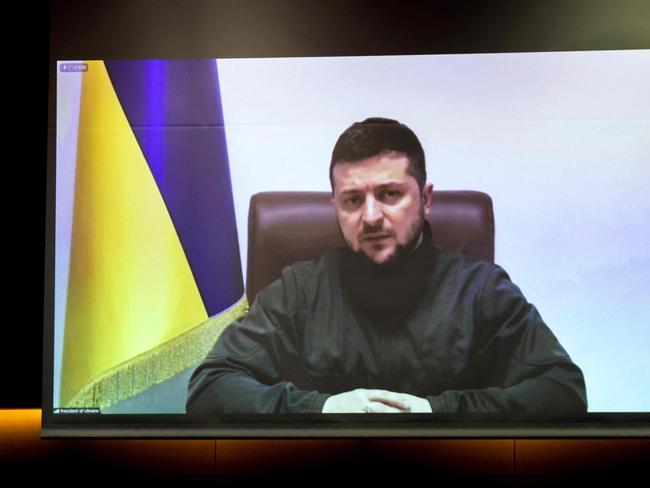
MERCENARIES SENT TO DO WHAT RUSSIAN ARMY COULDN’T
Vladimir Putin has deployed his personal army to secure the war front in east Ukraine, hoping the mercenary force can do what his military has so far failed to achieve.
At least 1000 men from the Wagner Group private army are moving into Donbas to break the stalemate in fighting in that region, picking up where Russian forces have failed to break through and, indeed, have been pushed back.
The British Government sanctioned the Wagner mercenary force last week, and specifically its alleged financial backer and Putin ally oligarch Yevgeny Prigozhin, in anticipation of the deployment, which its Defence Ministry confirmed yesterday.
“They are expected to deploy more than 1000 mercenaries, including senior leaders of the organisation, to undertake combat operations,” the ministry said in a tweet.
The fighting force came to prominence in 2014 when it aided a separatist uprising in east Ukraine’s Donbas region and then the Russian invasion in 2014, with its involvement allowing the Kremlin to exercise plausible deniability of resultant actions.
It was elements of this mercenary force that also allegedly were deployed and failed to assassinate Ukraine President Volodymyr Zelenskyy in the past month and also into Africa where Russia is attempting to exert influence over various despots and mineral operations.
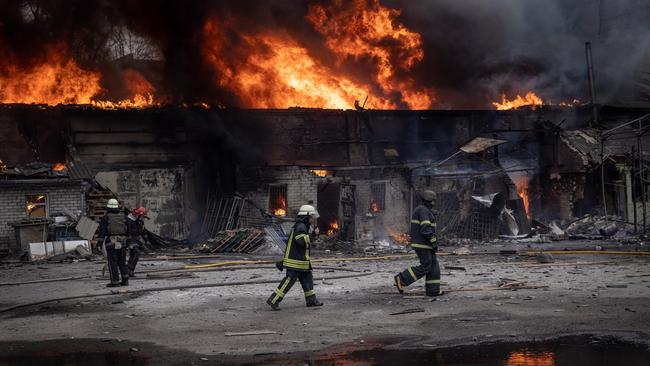
Russia has moved this week to concentrate forces to Ukraine’s east and south to secure the Donbas region, where it has fought Ukrainian forces for eight years, to split Ukraine into two halves.
Ahead of the peace talks in neutral Turkey, Mr Zelenskyy said he was open to a compromise on the fate of Donbas if it led to Russia ending its invasion and war.
But the stalling of Russian military advances has allowed Ukrainian forces to retake key battlegrounds including about Kyiv and the townships of Irpin and Trostyanets, south of Sumy, which were declared “liberated” from Russian forces.
Russians were also no longer in full control of Kherson, the first major city to fall to Moscow’s forces.
After 33 days of war, the embattled city of Mariupol on the Ukraine coast also remains contested with Ukraine forces holding Russian troops at bay.
“The enemy is weakened, disoriented, much of it is cut off from logistics and the main forces,” the Ukraine Armed Forces general staff said in a communique.
“The command of the Russian occupying forces is trying to compensate for the decline in the combat potential of the enemy’s units by indiscriminate artillery fire and rocket-bomb attacks, thus destroying the infrastructure of Ukrainian cities.”
In other developments yesterday, US President Joe Biden made no apologies for calling for President Putin to be removed from office on the weekend, saying he was expressing his “moral outrage” not a new US policy.
Originally published as UN’s Human Rights Council launches probe into Russian ‘abuses’ in Ukraine
Read related topics:Russia & Ukraine Conflict



